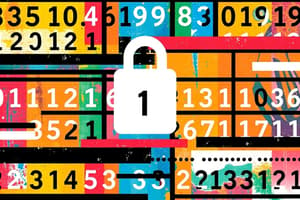Podcast
Questions and Answers
Which of the following is a key limitation of perfect security in cryptography?
Which of the following is a key limitation of perfect security in cryptography?
- Cryptography can only be used for data confidentiality, not secure communication or authentication.
- Cryptographic algorithms are always vulnerable to side-channel attacks and quantum computing.
- Any encryption algorithm can eventually be broken with sufficiently advanced computing power. (correct)
- Cryptographic systems aim to provide practical levels of security, not absolute protection.
What is the primary goal of cryptographic systems, according to the passage?
What is the primary goal of cryptographic systems, according to the passage?
- To provide absolute, unbreakable protection for all data.
- To create communication channels that are secure against any form of eavesdropping.
- To develop encryption algorithms that are immune to all types of attacks.
- To balance protection with the available computational resources. (correct)
Which of the following historical ciphers is mentioned in the passage?
Which of the following historical ciphers is mentioned in the passage?
- Vigenère cipher
- Playfair cipher
- Caesar cipher (correct)
- Enigma cipher
According to the passage, what is the relationship between cryptography and mathematics?
According to the passage, what is the relationship between cryptography and mathematics?
What is the main reason why perfect security is considered theoretically impossible in cryptography?
What is the main reason why perfect security is considered theoretically impossible in cryptography?
What is the main purpose of the passage in discussing historical encryption methods?
What is the main purpose of the passage in discussing historical encryption methods?
According to the passage, what is considered to be theoretically impossible?
According to the passage, what is considered to be theoretically impossible?
Which of the following is a key characteristic of symmetric-key encryption?
Which of the following is a key characteristic of symmetric-key encryption?
What is the main challenge associated with symmetric-key encryption, according to the passage?
What is the main challenge associated with symmetric-key encryption, according to the passage?
What is the passage's main recommendation for organizations regarding cryptographic security?
What is the passage's main recommendation for organizations regarding cryptographic security?
Flashcards are hidden until you start studying
Study Notes
Cryptography is a branch of mathematics focused on creating secure communication channels and protecting data through the use of mathematical algorithms and techniques. While cryptography offers numerous benefits, such as data confidentiality, secure communication, authentication, and password protection, there are limitations to the practical application of perfect security.
Limitation of Perfect Security
The concept of perfect security assumes that an encryption algorithm has zero probability of being cracked, given enough computational power and time. However, perfect security is theoretically impossible, as any encryption algorithm can eventually be broken with sufficiently advanced computing power. In practice, cryptographic systems aim to provide practical levels of security, balancing protection with the computational resources available.
Perfect Security
Perfect security refers to an ideal state where all cryptographic systems are invulnerable to any type of attack, including brute force attempts, side-channel attacks, or quantum attacks. While perfect security is impossible, researchers continue to develop stronger encryption algorithms and explore new ways to enhance the security of existing systems.
Historical Ciphers
Historical ciphers played a significant role in early forms of cryptography, dating back to ancient civilizations. These ciphers include Caesar cipher, substitution ciphers, and transposition ciphers. While these historical encryption methods were once considered secure, they have since been broken through the advancements in cryptography. However, they serve as a foundation for understanding how modern encryption techniques have evolved over time.
Symmetric-Key Encryption
Symmetric-key encryption involves using the same key for both encryption and decryption. Examples of symmetric-key algorithms include Advanced Encryption Standard (AES) and Data Encryption Standard (DES). These algorithms provide a strong level of security but require secure key management practices to ensure that only authorized parties can access the encrypted data.
In conclusion, while perfect security is theoretically impossible, cryptography continues to evolve with the development of stronger encryption algorithms and post-quantum cryptography research. Organizations must carefully choose cryptographic algorithms based on their security requirements, consider factors such as computational resources, and implement proper key management practices to maintain strong cryptographic performance and security. Additionally, user education and awareness are crucial for minimizing the impact of human error on cryptographic security.
Studying That Suits You
Use AI to generate personalized quizzes and flashcards to suit your learning preferences.




